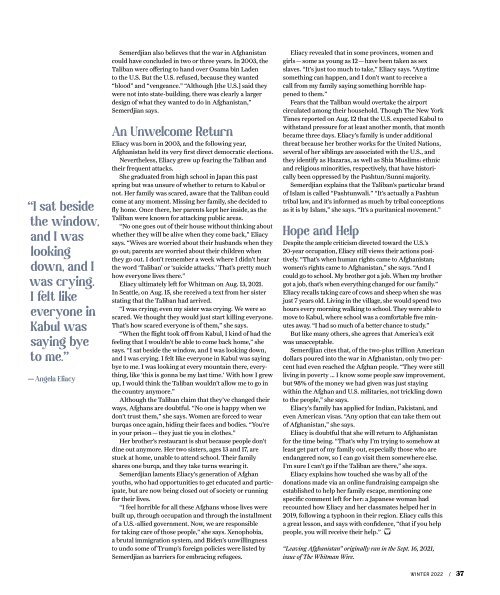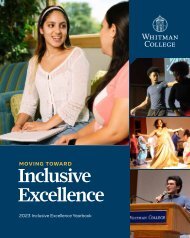Create successful ePaper yourself
Turn your PDF publications into a flip-book with our unique Google optimized e-Paper software.
“I sat beside<br />
the window,<br />
and I was<br />
looking<br />
down, and I<br />
was crying.<br />
I felt like<br />
everyone in<br />
Kabul was<br />
saying bye<br />
to me.”<br />
—Angela Eliacy<br />
Semerdjian also believes that the war in Afghanistan<br />
could have concluded in two or three years. In 2003, the<br />
Taliban were offering to hand over Osama bin Laden<br />
to the U.S. But the U.S. refused, because they wanted<br />
“blood” and “vengeance.” “Although [the U.S.] said they<br />
were not into state-building, there was clearly a larger<br />
design of what they wanted to do in Afghanistan,”<br />
Semerdjian says.<br />
An Unwelcome Return<br />
Eliacy was born in 2003, and the following year,<br />
Afghanistan held its very first direct democratic elections.<br />
Nevertheless, Eliacy grew up fearing the Taliban and<br />
their frequent attacks.<br />
She graduated from high school in Japan this past<br />
spring but was unsure of whether to return to Kabul or<br />
not. Her family was scared, aware that the Taliban could<br />
come at any moment. Missing her family, she decided to<br />
fly home. Once there, her parents kept her inside, as the<br />
Taliban were known for attacking public areas.<br />
“No one goes out of their house without thinking about<br />
whether they will be alive when they come back,” Eliacy<br />
says. “Wives are worried about their husbands when they<br />
go out; parents are worried about their children when<br />
they go out. I don’t remember a week where I didn’t hear<br />
the word ‘Taliban’ or ‘suicide attacks.’ That’s pretty much<br />
how everyone lives there.”<br />
Eliacy ultimately left for <strong>Whitman</strong> on Aug. 13, 2021.<br />
In Seattle, on Aug. 15, she received a text from her sister<br />
stating that the Taliban had arrived.<br />
“I was crying; even my sister was crying. We were so<br />
scared. We thought they would just start killing everyone.<br />
That’s how scared everyone is of them,” she says.<br />
“When the flight took off from Kabul, I kind of had the<br />
feeling that I wouldn’t be able to come back home,” she<br />
says. “I sat beside the window, and I was looking down,<br />
and I was crying. I felt like everyone in Kabul was saying<br />
bye to me. I was looking at every mountain there, everything,<br />
like ‘this is gonna be my last time.’ With how I grew<br />
up, I would think the Taliban wouldn’t allow me to go in<br />
the country anymore.”<br />
Although the Taliban claim that they’ve changed their<br />
ways, Afghans are doubtful. “No one is happy when we<br />
don’t trust them,” she says. Women are forced to wear<br />
burqas once again, hiding their faces and bodies. “You’re<br />
in your prison—they just tie you in clothes.”<br />
Her brother’s restaurant is shut because people don’t<br />
dine out anymore. Her two sisters, ages 13 and 17, are<br />
stuck at home, unable to attend school. Their family<br />
shares one burqa, and they take turns wearing it.<br />
Semerdjian laments Eliacy’s generation of Afghan<br />
youths, who had opportunities to get educated and participate,<br />
but are now being closed out of society or running<br />
for their lives.<br />
“I feel horrible for all these Afghans whose lives were<br />
built up, through occupation and through the installment<br />
of a U.S.-allied government. Now, we are responsible<br />
for taking care of those people,” she says. Xenophobia,<br />
a brutal immigration system, and Biden’s unwillingness<br />
to undo some of Trump’s foreign policies were listed by<br />
Semerdjian as barriers for embracing refugees.<br />
Eliacy revealed that in some provinces, women and<br />
girls—some as young as 12—have been taken as sex<br />
slaves. “It’s just too much to take,” Eliacy says. “Anytime<br />
something can happen, and I don’t want to receive a<br />
call from my family saying something horrible happened<br />
to them.”<br />
Fears that the Taliban would overtake the airport<br />
circulated among their household. Though The New York<br />
Times reported on Aug. 12 that the U.S. expected Kabul to<br />
withstand pressure for at least another month, that month<br />
became three days. Eliacy’s family is under additional<br />
threat because her brother works for the United Nations,<br />
several of her siblings are associated with the U.S., and<br />
they identify as Hazaras, as well as Shia Muslims: ethnic<br />
and religious minorities, respectively, that have historically<br />
been oppressed by the Pashtun/Sunni majority.<br />
Semerdjian explains that the Taliban’s particular brand<br />
of Islam is called “Pashtunwali.” “It’s actually a Pashtun<br />
tribal law, and it’s informed as much by tribal conceptions<br />
as it is by Islam,” she says. “It’s a puritanical movement.”<br />
Hope and Help<br />
Despite the ample criticism directed toward the U.S.’s<br />
20-year occupation, Eliacy still views their actions positively.<br />
“That’s when human rights came to Afghanistan;<br />
women’s rights came to Afghanistan,” she says. “And I<br />
could go to school. My brother got a job. When my brother<br />
got a job, that’s when everything changed for our family.”<br />
Eliacy recalls taking care of cows and sheep when she was<br />
just 7 years old. Living in the village, she would spend two<br />
hours every morning walking to school. They were able to<br />
move to Kabul, where school was a comfortable five minutes<br />
away. “I had so much of a better chance to study.”<br />
But like many others, she agrees that America’s exit<br />
was unacceptable.<br />
Semerdjian cites that, of the two-plus trillion American<br />
dollars poured into the war in Afghanistan, only two percent<br />
had even reached the Afghan people. “They were still<br />
living in poverty … I know some people saw improvement,<br />
but 98% of the money we had given was just staying<br />
within the Afghan and U.S. militaries, not trickling down<br />
to the people,” she says.<br />
Eliacy’s family has applied for Indian, Pakistani, and<br />
even American visas. “Any option that can take them out<br />
of Afghanistan,” she says.<br />
Eliacy is doubtful that she will return to Afghanistan<br />
for the time being. “That’s why I’m trying to somehow at<br />
least get part of my family out, especially those who are<br />
endangered now, so I can go visit them somewhere else.<br />
I’m sure I can’t go if the Taliban are there,” she says.<br />
Eliacy explains how touched she was by all of the<br />
donations made via an online fundraising campaign she<br />
established to help her family escape, mentioning one<br />
specific comment left for her: a Japanese woman had<br />
recounted how Eliacy and her classmates helped her in<br />
2019, following a typhoon in their region. Eliacy calls this<br />
a great lesson, and says with confidence, “that if you help<br />
people, you will receive their help.”<br />
“Leaving Afghanistan” originally ran in the Sept. 16, 2021,<br />
issue of The <strong>Whitman</strong> Wire.<br />
WINTER <strong>2022</strong> / 37
















